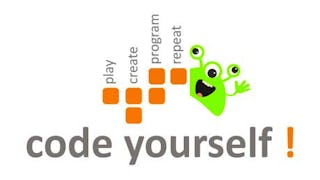- Browse
- Programming
Programming Courses
Programming courses can help you learn coding languages like Python, Java, and JavaScript, as well as concepts such as algorithms, data structures, and software development methodologies. You can build skills in debugging, version control, and writing efficient code. Many courses introduce tools like Git for version control, integrated development environments (IDEs) like Visual Studio Code, and frameworks such as React or Django, that support developing web applications and software solutions.
Popular Programming Courses and Certifications
 Status: Free TrialFree TrialU
Status: Free TrialFree TrialUUniversity of Michigan
Skills you'll gain: Programming Principles, Computer Programming, Python Programming, Computational Thinking, Software Installation, Development Environment
4.8·Rating, 4.8 out of 5 stars233K reviewsBeginner · Course · 1 - 3 Months
 Status: Free TrialFree Trial
Status: Free TrialFree TrialSkills you'll gain: Object Oriented Programming (OOP), Unit Testing, Test Driven Development (TDD), Programming Principles, Software Testing, Data Structures, Python Programming, Program Development, Computer Programming, Development Environment, Integrated Development Environments, Debugging, Algorithms, Django (Web Framework), Cloud Hosting
4.6·Rating, 4.6 out of 5 stars1.8K reviewsBeginner · Course · 1 - 3 Months
 Status: Free TrialFree TrialD
Status: Free TrialFree TrialDDuke University
Skills you'll gain: Debugging, File I/O, Programming Principles, Maintainability, Software Testing, Program Development, C (Programming Language), Algorithms, Simulations, System Programming, Computer Programming, Data Structures, Software Development, Software Engineering, Command-Line Interface, Development Environment, User Interface (UI), Solution Design, Problem Solving, Software Design
4.6·Rating, 4.6 out of 5 stars7.4K reviewsBeginner · Specialization · 3 - 6 Months
 Status: FreeFreeP
Status: FreeFreePPrinceton University
Skills you'll gain: Programming Principles, Computer Programming, Object Oriented Programming (OOP), Performance Tuning, Data Structures, Java Programming, Java, Program Development, File I/O, Computational Thinking, Computer Science, Algorithms, Animations, Debugging
4.7·Rating, 4.7 out of 5 stars1.3K reviewsBeginner · Course · 1 - 3 Months
 Status: PreviewPreviewT
Status: PreviewPreviewTThe University of Edinburgh
Skills you'll gain: Game Design, Software Engineering, Programming Principles, Software Development, Software Design, Computer Programming, Computational Thinking, Debugging, Algorithms
4.7·Rating, 4.7 out of 5 stars3.7K reviewsBeginner · Course · 1 - 3 Months
 Status: Free TrialFree TrialJ
Status: Free TrialFree TrialJJohns Hopkins University
Skills you'll gain: Artificial Neural Networks, Image Analysis, Event-Driven Programming, Scalability, Deep Learning, C and C++, Performance Tuning, Convolutional Neural Networks, Data-oriented programming, C++ (Programming Language), Digital Signal Processing, Linear Algebra, Distributed Computing, Computer Graphics, System Programming, Mathematical Software, Numerical Analysis, Programming Principles, Computer Architecture, Machine Learning
Build toward a degree
2.8·Rating, 2.8 out of 5 stars188 reviewsIntermediate · Specialization · 3 - 6 Months
What brings you to Coursera today?
 Status: Free TrialFree TrialU
Status: Free TrialFree TrialUUniversity of Michigan
Skills you'll gain: C (Programming Language), C++ (Programming Language), Object Oriented Programming (OOP), Data Structures, Programming Principles, Algorithms, Computer Programming, Software Design, Application Security, Other Programming Languages, Python Programming, Java Programming, System Programming, Computer Architecture, Performance Tuning, Unix, Computer Science, Debugging
4.5·Rating, 4.5 out of 5 stars235 reviewsIntermediate · Specialization · 3 - 6 Months
 Status: Free TrialFree Trial
Status: Free TrialFree TrialSkills you'll gain: Jest (JavaScript Testing Framework), Web Development Tools, Javascript, Unit Testing, Web Applications, Object Oriented Programming (OOP), Node.JS, JSON, Computer Programming, Data Structures, Debugging, Package and Software Management, Program Development, Front-End Web Development, Functional Design
4.7·Rating, 4.7 out of 5 stars4.9K reviewsBeginner · Course · 1 - 3 Months
 Status: Free TrialFree TrialD
Status: Free TrialFree TrialDDuke University
Skills you'll gain: Programming Principles, Algorithms, C (Programming Language), Computer Programming, Software Engineering, Problem Solving, Solution Design
4.7·Rating, 4.7 out of 5 stars7K reviewsBeginner · Course · 1 - 4 Weeks
 Status: Free TrialFree TrialD
Status: Free TrialFree TrialDDartmouth College
Skills you'll gain: Command-Line Interface, C (Programming Language), Linux Commands, Linux, Embedded Systems, File I/O, Embedded Software, Software Visualization, Programming Principles, Computer Engineering, Linux Servers, File Systems, System Programming, Algorithms, Computer Architecture, Computer Programming, Software Documentation, Computer Science, Software Engineering, Debugging
4.6·Rating, 4.6 out of 5 stars434 reviewsBeginner · Specialization · 3 - 6 Months
 Status: Free TrialFree TrialD
Status: Free TrialFree TrialDDuke University
Skills you'll gain: File I/O, Java Programming, Software Design, Debugging, Software Engineering, Javascript, Computer Programming, Event-Driven Programming, Encryption, Algorithms, Image Analysis, AI Personalization, Program Development, Data Processing, Statistical Analysis, Data Import/Export, Predictive Modeling, Integrated Development Environments, Data Analysis, Cascading Style Sheets (CSS)
4.6·Rating, 4.6 out of 5 stars22K reviewsBeginner · Specialization · 3 - 6 Months
 Status: Free TrialFree TrialU
Status: Free TrialFree TrialUUniversity of California, Irvine
Skills you'll gain: Go (Programming Language), Back-End Web Development, Object Oriented Programming (OOP), System Programming, Debugging, Algorithms, Functional Design, Computer Programming Tools, Data Access, Data Structures, Software Design, Operating Systems, Computer Architecture
4.6·Rating, 4.6 out of 5 stars3K reviewsIntermediate · Specialization · 3 - 6 Months
In summary, here are 10 of our most popular programming courses
- Programming for Everybody (Getting Started with Python): University of Michigan
- Programming in Python: Meta
- Introductory C Programming: Duke University
- Computer Science: Programming with a Purpose: Princeton University
- Code Yourself! An Introduction to Programming: The University of Edinburgh
- GPU Programming: Johns Hopkins University
- C Programming for Everybody: University of Michigan
- Programming with JavaScript: Meta
- Programming Fundamentals: Duke University
- C Programming with Linux: Dartmouth College
Frequently Asked Questions about Programming
Programming is the process of creating a set of instructions that a computer can follow to perform specific tasks. It is a fundamental skill in today's digital world, enabling the development of software applications, websites, and systems that drive innovation and efficiency across various industries. Understanding programming is essential not only for those looking to enter tech-related fields but also for anyone interested in enhancing their problem-solving skills and logical thinking.
A variety of job opportunities exist in the programming field, ranging from software developers and web developers to data analysts and systems engineers. Positions such as mobile app developers, game developers, and database administrators also fall under the programming umbrella. The demand for skilled programmers continues to grow, making it a promising career path for those equipped with the right skills.
To succeed in programming, you should develop a solid foundation in several key skills. These include understanding programming languages such as Python, Java, or C++, as well as concepts like algorithms, data structures, and software development methodologies. Familiarity with version control systems, debugging techniques, and problem-solving strategies is also crucial. Building a portfolio of projects can further enhance your employability.
There are many excellent online programming courses available that cater to different skill levels and interests. For beginners, courses like the C Programming for Everybody Specialization provide a comprehensive introduction. More advanced learners might consider the C, Go, and C++: A Comprehensive Introduction to Programming Specialization to deepen their knowledge.
Yes. You can start learning programming on Coursera for free in two ways:
- Preview the first module of many programming courses at no cost. This includes video lessons, readings, graded assignments, and Coursera Coach (where available).
- Start a 7-day free trial for Specializations or Coursera Plus. This gives you full access to all course content across eligible programs within the timeframe of your trial.
If you want to keep learning, earn a certificate in programming, or unlock full course access after the preview or trial, you can upgrade or apply for financial aid.
Learning programming can be approached through various methods. Start by selecting a programming language that interests you and find online resources or courses that suit your learning style. Practice coding regularly, work on small projects, and engage with online communities for support. Utilizing platforms like Coursera can provide structured learning paths and access to expert instructors.
Programming courses typically cover a range of topics, including syntax and semantics of programming languages, control structures, data types, functions, and object-oriented programming. Advanced courses may explore algorithms, software design principles, and application development. Hands-on projects are often included to reinforce learning and provide practical experience.
For training and upskilling employees, courses like the Microsoft R Programming for Everyone Professional Certificate can be particularly beneficial. These programs are designed to enhance programming skills relevant to industry needs, ensuring that employees are equipped with the latest knowledge and techniques.










